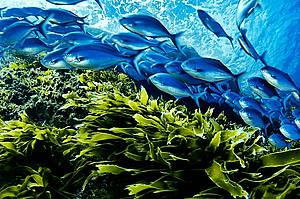WWF’s Bay of Plenty fund opens to help environmental restoration post Rena
 WWF-New Zealand media release – for immediate release
WWF-New Zealand media release – for immediate release
29 March 2012
WWF’s Bay of Plenty fund opens to help environmental restoration post Rena disaster
As Tauranga gets set to lead New Zealand’s Earth Hour celebrations this Sat (31 March) , WWF-New Zealand is today launching a $60,000 fund to help communities restoring fragile coastal ecosystems affected by the grounding of the MV Rena and resulting marine pollution and oil spill.
Tauranga’s Earth Hour celebrations will recognise the local community’s efforts to protect their precious beaches and coastal environment in the wake of the Rena disaster which struck almost six months ago. Earth Hour is the annual ‘lights out for the planet’ event, launched by WWF to inspire people that taking action together to protect our world can make a powerful difference.
WWF’s Bay of Plenty Restoration Fund was established after $30,000 was received from generous WWF supporters nationwide, with a further $30,000 coming from The Tindall Foundation.
Marc Slade, WWF-New Zealand’s community fund manager, said: “The community response to the Rena disaster was overwhelmingly positive, with thousands of volunteers assisting the official clean-up efforts. It is fitting to be celebrating those efforts this Earth Hour.
“It is also important to recognise that long after the oil has been cleared off beaches and the last penguins and other rescued birds have been released, there may well be other less visible long-term impacts on the ecosystem which we don’t yet fully understand.
“WWF is proud to support projects committed to long-term protection of wildlife and restoration of critical habitats, such as beaches, sand dunes and estuaries, so the environment is able to fully recover and thrive.”
In the first two weeks following the grounding, WWF marine staff joined the National Oiled Wildlife Recovery Team, coordinated by Maritime New Zealand, to assist with wildlife rescue and clean up efforts and to assess the environmental impacts.
More than two thousand dead seabirds were collected in the months following the Rena incident, however the true number of birds and other wildlife killed by the oil spill will be much higher, as the majority would have been oiled and died at sea. WWF is concerned about the impacts on breeding for some species – such as endangered New Zealand dotterels and little blue penguins – and the long term environmental impacts throughout the marine ecosystem.
“The fund will also support monitoring of affected wildlife, to establish how this disaster affects them over the coming breeding seasons”, said Slade. “We encourage local community, iwi or hapu groups involved with conservation in the region to apply.”
The fund is open from 29 March and closes 27 April and full details including application forms and criteria are available on wwf.org.nz
loading...
loading...
Tags: WWF


What our visitors are saying…